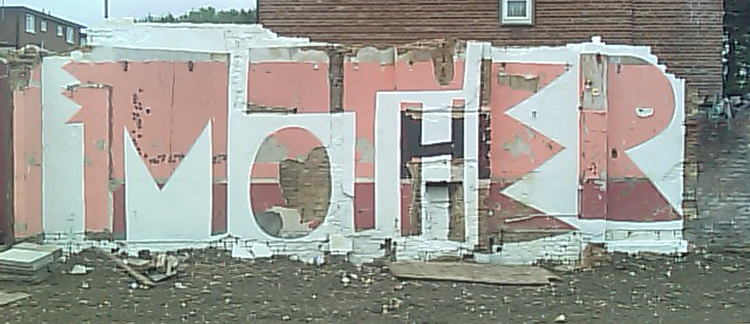As this Special Issue of Studies in the Maternal goes to press in October 2016, a big shift is happening in the political reality of the UK and the wider world. Women in Poland are marching against tightening abortion rules, anti-immigration rhetoric is escalating while mothers and children wait hopelessly in ramshackle camps across Europe, and at the current rate, the gender pay gap may take 118 more years to close. Such fluidity and impermanency – of living conditions, of employment, of female rights – are the concerns of articles in this issue. The articles also respond to an art world troubled by political gender inequalities. This is an art and educational world that are unable to acknowledge the different needs and realities that artists experience during one of the most productive periods in their lives; that of becoming a mother.
This discussion began in June 2015, during the Motherhood and Creative Practice: Maternal Structures in Creative Work conference held in London, UK. We explored what we have learned from artists fighting this battle for acknowledgement, and how we may develop this. There was palpable energy in the room – some of the foundational figures of the maternal artistic movement came together in the same space as many vigorously engaged younger practitioners. Many things were won by the previous generation, many things need to be won once again, and many things need to be rethought for future generations.
We decided that this special issue would focus on performative strategies explored by creative practitioners in order to highlight spheres of maternal invisibility. Maternal work, according to Sara Ruddick, demands thoughtfulness, out of which a distinctive discipline emerges.1 This discipline of maternal thought and practice establishes criteria for determining failure and success, sets priorities, and identifies structures of creative expression. We are particularly interested in the variety of structures and responses to the maternal that creative practitioners use. The issue therefore offers an interdisciplinary exploration of what we are calling ‘maternal structures’ in creative work.
We invited four scholars, two collectives/projects and seven creative practitioners to describe their approach and experiences to performing the maternal. Our editorial focus is on the lived experiences of the artists and scholars, who, in their articles, address a number of their concerns about the politics and policies surrounding the maternal and creativity today.
Kim Dhillon and Andrea Francke (Invisible Spaces of Parenthood) openly question the current infrastructural support for parenting; that lags behind the ideals of those brought up after the Second Wave of the gender revolution. In their paper The C-Word: Motherhood, Activism, Art, and Childcare, they explore how art provides a space with which to explore the complexities of childcare.
In her paper ‘she breast feeds in the boardroom’ – Working Mothers Onstage, Dr Helen Grime investigates the absence of representations of the working mother archetype on the British stage from the late C19th to the present day. The investigation surveys examples of stage representations of working motherhood and attempts to categorise and contextualise them.
In her article Performing the Breastfeeding Body: Lactivism and Art Interventions Rachel Epp Buller addresses the ways in which three contemporary North American artist-parents position themselves and their work as potential agents of cultural change around the topic of breastfeeding. Their socially-engaged works challenge the increasing social divisions, seen particularly in the United States, around the breastfeeding body.
Finally, Natalie Loveless has created a forum on maternal activist art and in her article Contemporary Mamactivist Artists she asks fourteen activist-mother-artists, whom she calls ‘mamactivist‘, to contemplate their artistic strategies in relation to maternal politics. One commonality they hold is that they take the maternal not as a biological facticity, but as a rich feminist site of political intervention.
As editors we also invited two collectives/projects to respond to the Special Issue focus and we are pleased to bring two very different perspectives into dialogue.
Christa Donner has produced a tactical report on the activities of the Chicago-based project Cultural ReProducers, a growing community and a creative platform supporting cultural workers who are having an active career in the arts.
The cyberfeminist art and theory collective subRosa discuss a project that took place as part of a residency at Carnegie Mellon University’s STUDIO for Creative Inquiry. subRosa members Faith Wilding and Hyla Willis collaborated to produce SmartMom which was their first interactive web-based project about the rapidly developing new biotechnological/medical/reproductive field known as Assisted Reproductive Technologies (ART) and the increasing medical, technological, and state control of women’s bodies, sexuality, pregnancy, and birth.
In addition, we have pleasure in including the work of four artists who deal with the (in)visibility of, and lack of language for, descriptions of the inner world of creating work about and around the maternal.
We selected Freddie Robbin’s pieces Bad Mother/Mad Mother, in which she communicates the intense emotional and physical relationship between a mother and a young child.
Clare Qualmann brings to the Special Issue her piece Perambulator, a spectacle of multiple prams and their pushers negotiating obstacles.
Tracey Kershaw’s piece 50 things my son doesn’t need me for explores the changing relationship between her son and herself, and speaks about issues of loss.
And finally, Deborah Dudley’s Brain Candy brings to the Issue a performative photographic series of mother-daughter collaborations investigating the relationship between adolescence and photography.
We are also happy to include Jenny Klein’s review of the exhibition New Maternalisms: Redux Curated by Natalie S. Loveless at the FAB Gallery University of Alberta, Edmonton in May, 2016.
We hope you enjoy this Special Issue and we look forward to your comments on Facebook, Twitter and the MaMSIE blog.
Elena Marchevska and Valerie Walkerdine
Notes
- Ruddick, Sara. Maternal Thinking: Toward a Politics of Peace. Boston: Beacon Press, 1989. p. 24 [^]
Competing Interests
The authors have no competing interests to declare.
